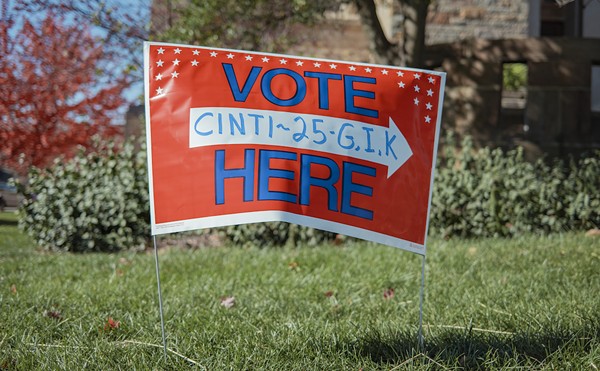If you're a prospective employee fielding a question about your salary history during a job application process, it can put you between a rock and a hard place — you don't want to price yourself out of the job, but you also don't want to end up with less than the job is worth because you don't make as much currently.
The question can be even tougher if you're a woman who experiences statistically lower earnings than men in the workplace. In Cincinnati, a recent study found that that women make 80 percent of what men make — a gap that is even larger for women of color.
Cincinnati City Council today passed legislation brought by member Tamaya Dennard that bars employers from asking about an applicant's salary history, a move supporters say would begin to address the wage gap women and minorities face in Cincinnati.
But the law could have some legal complications. Philadelphia, the first city in the country to adopt such a law in January 2017, has since come under legal fire for the ban.
Barring an employer from inquiring about previous compensation keeps that information from affecting salary offers to prospective employees, thus making it less likely unequal pay practices will continue. At least, that's the theory.
The problem is, the 13 states and 10 municipalities that have implemented similar laws haven't had them on the books long enough to judge results.
And in Philadelphia, a federal district court recently struck down a similar law on First Amendment grounds after a lawsuit by the local chamber of commerce there. The city has appealed that decision.
Katie Eagan, Vice President of Government Affairs with the Cincinnati USA Regional Chamber, said last month that the chamber and its member businesses are very supportive of efforts toward greater wage equity. But Egan says the proposed law isn't the way to get there.
Eagan applauds changes to Dennard's proposal, including a clause that would shield employers from legal action when an applicant volunteers past pay information, but she says there are other concerns the proposal leaves unaddressed.
"It is our belief that there are alternative ways to achieve these policies' ends," Eagan told council last month, saying that education efforts and incentivizing employers to voluntarily drop questions about salary history would be a better, less legally-fraught option than "onerous" regulation.
"We're not here to protect any businesses' right to ask any particular question," Eagan said. "We are here to protect the First Amendment rights of businesses and their protections to operate in an air where they are able to responsibly use hiring practices."
Some time after the legislation was introduced, the chamber announced it would issue report cards about how well council members align with chamber priorities. Some Democratic council members who support the wage ordinance say that felt like a "threat," though council member Amy Murray argued that any group has a right to grade elected officials on their votes.
Murray, a Republican, voted against the legislation.
"I want to work with you because I think there are other ways to do this, but I think when we pass laws that affect how our business community does business, it eventually affects our economy," she said.
Council member P.G. Sittenfeld, however, argued that boosting diversity and inclusion would actually be good for business.
"I can promise you that talent wants to be in cities that are pro-women, pro-LGBT, pro-diversity and pro-environment," Sittenfeld said.
Dennard says she worked with chambers of commerce to make amendments to her proposal, including a so-called "safe harbor" clause by which employers can receive certification that they don't consider previous salaries in hiring decisions and the creation of a working group headed by the city manager to advise employers about the legislation, which will take effect next year.
"When we first drew up this legislation, the very first organizations we reached out to were chambers of commerce," Dennard said today. "We reached out to every single chamber in this area. We did make a lot of amendments to the legislation. We couldn't make all the changes, because then it would be watered down and lose the intent. We engaged continuously throughout the process."
There are a number of questions employers already aren't allowed to ask during the hiring process, including those about age, race, sexual orientation and other personal details. The difference between those questions and questions about previous earnings, according to Cincinnati City Solicitor Paula Boggs Muething, is that the already-barred questions tie directly to instances of discrimination demonstrated in research and recognized by past court cases.
But council members who support the legislation say that they've found research that shows a link between wage disparities and questions about previous wages.
“The Philadelphia court case found against the legislation, but the reasoning was that the council didn’t have any evidence before it that linked the proposed rule and discrimination," council member David Mann said. "A lot of research was done… there are some recent, peer-reviewed studies by scholars across the country that document that there is a correlation between this practice and wage disparities for women. I believe that a federal judge will say about our process, ‘Hey, there was evidence to support the conclusion that underlies the legislation.' ”
Assistant City Solicitor Luke Blocher and council member Chris Seelbach had a brief exchange about whether the law would pass legal muster. Blocher said the version that passed council was better than previous ones.
“I think we of course only draft ordinances that are appropriate, but we also understand that people bring legal challenges," he said. "We believe this ordinance puts us in the best position to withstand legal scrutiny.”
Other groups, including the AFL-CIO and The Women's Fund of The Greater Cincinnati Foundation, support the law.
"Of all the potential preventions the city could take to curtail pay inequity, the Women's Fund believes this legislation is the most effective without being too onerous to business," Women's Fund Executive Director Meghan Cummings told council last month. "Simply put, under this ordinance, employees who have been underpaid will have the opportunity to reset and shed the historic pay inequity with their next employment opportunity."
Dennard first floated the questioning restriction in October last year. A working group was put together to research potential legislation, and the proposal before council now came out of that work.
"We wanted to create something that was bold and a little bit different for Cincinnati," Dennard said last month, citing studies about the city's current pay inequities as a driver of the law.
A 2017 study by the University of Cincinnati Economics Center found that in Cincinnati, women make about 80 cents on the dollar compared to men when qualifications, age and other attributes are controlled for.
That gap is greater for women of color. A study last year by PolicyLink found that 18 percent of Latinas and 17.6 percent of black women in Hamilton County in 2014 were “working poor”: that is, working full-time for income that is less than 200 percent of the federal poverty guidelines. Just 5.4 percent of white women fell into that category.
Ohio is near the top of the list for states with big wage gaps between men and women, a 2018 study found. According to research by the National Partnership for Women and Families, the Buckeye State ranks 14th in the nation for that dubious distinction, with women earning roughly 77 cents for every dollar men earn and losing an annual $29 billion in wages. Louisiana has the highest wage gap in the country — women there earn 70 cents on the dollar. New York, where women earn 11 cents less than men on average, has the lowest wage gap.






